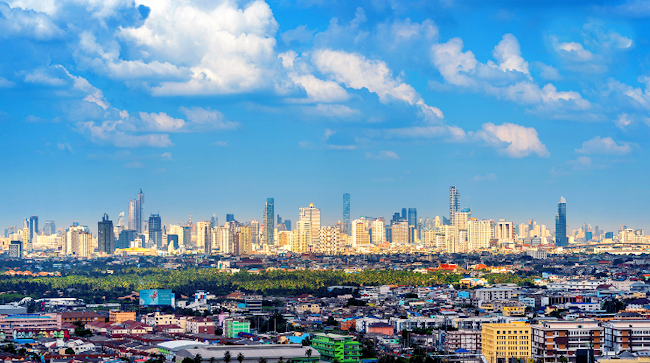The decelerating export growth in July has raised concerns that the outlook for Thailand’s economic growth may be bleak because of an increasingly likely global slowdown.
The Thai economy grew 2.5 percent year on year in the second quarter of the year, continuing the growth trajectory one has seen — of 2.3 percent in the first quarter this year and 1.8 percent in the fourth quarter of last year.
“The GDP growth rate in the second quarter, however, was slow compared to the market expectation of 3 percent,” said Kirida Bhaopichitr, research director for International Economics and Development Policy at Thailand Development Research Institute, an independent think-tank.
The factors driving the economy in the second quarter were export, consumption, and tourism, according to Danucha Pichayanan, secretary-general at the National Economic and Social Development Council (NESDC), the state-owned think-tank.
The expansion came from acceleration in the services sector, partly due to relaxation of COVID-19 restrictions and the continuous implementation of the government’s stimulus measures to support tourism, resulting in a substantial surge in the number of foreign tourist arrivals and Thai visitors, said the NESDC.
The second quarter saw the service sector grow by 4.6 percent, accelerating from 2.9 percent in the first quarter of 2022. Besides, the agricultural sector expanded by 4.4 percent, as a result of the higher yields of main crops. However, the industrial sector declined by 1.8 percent, from a rise of 0.6 percent in the first quarter of 2022, due to lower production.
Private consumption expenditure increased by 6.9 percent in the second quarter of the year, nearly doubling from a 3.5 percent rise in the first quarter.
The expansion was reflected in the 13.7 percent growth in net services, an over three times surge from 4.1 percent in the previous quarter. Moreover, spending on semi-durable goods continued to expand. In contrast, the spending on durable and non-durable goods rose by 3.4 percent and 2.7 percent, compared to 4.5 percent and 3.3 percent in the previous quarter, respectively.
But looking ahead, Kirida warned of weakening consumer spending as the prices of goods will rise in the latter part of this year. She said that corporates had tried to avoid passing the higher cost burden on to consumers in the last several months, but they have started to increase the prices of their products.
Weak investment
Private investment grew by 2.3 percent in the second quarter of the year, decelerating from 2.9 percent in the previous quarter. Meanwhile, public investment fell by 9.0 percent, continuing the downward trend from a 4.7 percent reduction in the first quarter.
Supavud Saicheua, an advisor at Kiatnakin Phatra financial group, said overall investment has remained weak for several years compared with other countries at a similar level of economic development.
Slowing export growth
Thai exports grew 4.3 percent in July and by 11.5 percent in the first seven months of the year, the Commerce Ministry has said.
“Exports are expected to grow 8 percent this year,” said Chaichan Chareonsuk, chairman of the Thai National Shippers’ Council, an exporters’ club.
He expressed concerns about the Chinese market. Despite the Chinese government starting to slowly ease its COVID-19 lockdown measures, Thai exports to China have failed to gather steam and contracted 20.6 percent in July. Thai exporters should closely monitor China’s economic conditions, he suggested.
China is one of Thailand’s major export markets along with the US, Europe, Japan and ASEAN.
The Chinese government aims to achieve economic growth of 5.5 percent this year, but major global banks have recently slashed their growth projection to around 3 percent, well below the official target. They cited the impact of the zero-COVID policy; Chinese authorities often impose city shutdowns when they find even a few cases of new infections.
Real estate problems stemming from debt defaults of property developers and a large number of home-buyers stopping their mortgage payments have deepened the Chinese property market crisis. Combined with the recent severe drought in large parts of the country, China presents a grim economic picture. China’s government launched a stimulus package worth about 1 trillion yuan recently but critics said it was too late and too little.
The US, one of Thailand’s largest export markets, is battling rapid rising inflation, the highest in over 40 years. The US Federal Reserve has increased its policy rate aggressively and has vowed to continue doing so, sparking fears of a recession. A recession in the US would have serious implications for the Thai export sector.


